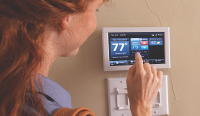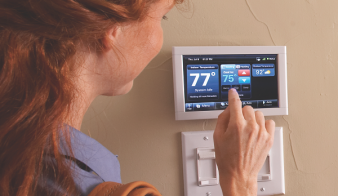It’s easy to become overwhelmed when thinking about the Internet of Things (IoT) and the complexities of smart home appliances and products. However, it’s never too late to educate yourself on the smart HVAC features and products that are sought by today’s customers. Before the dawn of the smart age, HVAC controls were synonymous with Read more
Residential HVAC

It’s easy to become overwhelmed when thinking about the Internet of Things (IoT) and the complexities of smart home appliances and products. However, it’s never too late to educate yourself on the smart HVAC features and products that are sought by today’s customers.
Before the dawn of the smart age, HVAC controls were synonymous with a simple thermostat that provided comfort from a system designed to focus only on heating or cooling a space. Functionality and practicality were the most vital roles of an HVAC system. With the increased role that technology plays in our daily lives, a lot has changed.
It’s no secret that smart home technology has reshaped the way consumers interact with their homes on a day-to-day basis. Now more than ever, consumers demand the ability to change their home’s climate with the push of a button or a simple voice command – without ever touching the thermostat and from anywhere, whether sitting on a couch or away on vacation. The focus has gone from practicality to the accessibility and convenience that come with an integrated smart HVAC system. Simply put, consumers demand more from their HVAC systems.
 Considering this smart home revolution, technology advancements have allowed for HVAC systems to evolve faster than can be absorbed by those in the field who must explain the functionality of the systems they are selling. How can one fully learn and understand the value of today’s smart HVAC? Dedicated time to learn about this rising tide of technology is important, but equally as helpful is to install and use similar HVAC-connected smart products within your own home. First-hand experience and determining how it can benefit your life will simplify explaining the value proposition to customers.
Considering this smart home revolution, technology advancements have allowed for HVAC systems to evolve faster than can be absorbed by those in the field who must explain the functionality of the systems they are selling. How can one fully learn and understand the value of today’s smart HVAC? Dedicated time to learn about this rising tide of technology is important, but equally as helpful is to install and use similar HVAC-connected smart products within your own home. First-hand experience and determining how it can benefit your life will simplify explaining the value proposition to customers.
While the smart home revolution has markedly changed the products, services, and accessibility HVAC dealers can offer, making the sale comes back to the homeowner’s perceived financial outlay and return on investment. Knowing how to explain the value in energy savings and diagnostic capabilities throughout the life of the product can help make the case for the more costly, higher efficiency system. Similarly helping consumers understand the value of convenience from a connected systems, such as voice interactions through Alexa, or even Geofence-based set points through the app, are paramount to moving customers up to a connected system.
It also provides an avenue to become a trusted advisor for your customers while building lifelong relationships for not only yourself, but also for the brands you’re selling. While a robust consumer value proposition is key to making the initial sale, the long term value to a contractor of a connected customer is even more impactful. Using remote diagnostic capabilities, servicing dealers can better maintain the customer relationship over time, deliver more efficient service when required, and be in the best position for a proactive replacement at the end of the product lifecycle.
By being transparent and showcasing factors such as energy savings, user experience, cross-device capabilities, etc. dealers can leverage the smart home revolution to position themselves as knowledgeable and trustworthy.
Because smart home technology has reshaped the way HVAC systems are viewed within the greater home ecosystem, it should be noted that not everyone (or every home) is right for a smart HVAC installation. Consumers often do their own research before consulting dealers about whether a technologically advanced HVAC system is right for their home. In the end, an educated consumer can be the best barometer for whether upgrading to a smart HVAC system makes the most sense.
 George Land, Connected Home Solutions General Manager for Ingersoll Rand Residential HVAC
George Land, Connected Home Solutions General Manager for Ingersoll Rand Residential HVAC
